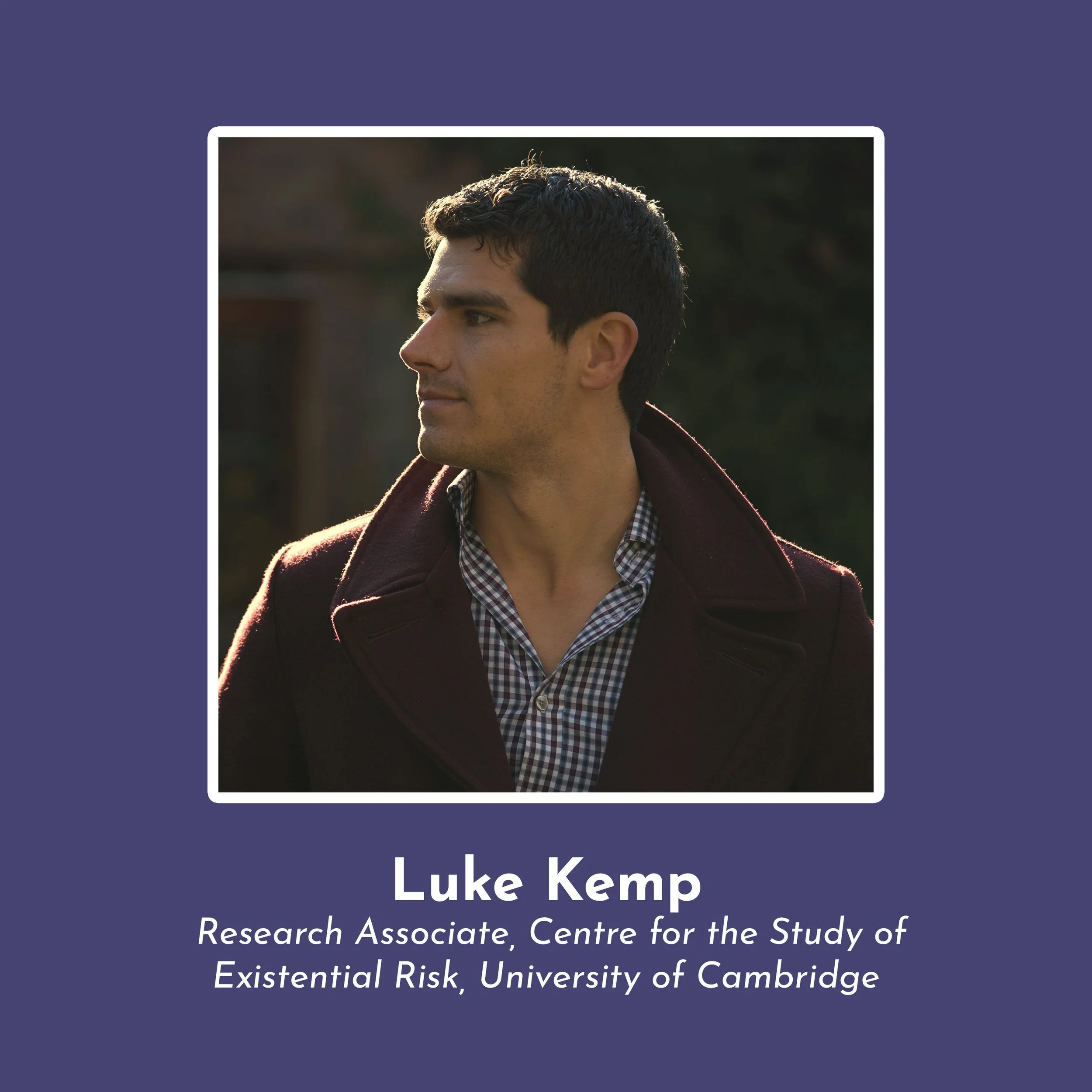Luke Kemp: “Existential Risks: The Biggest Threats to Life as We Know It”
Episode 153
December 4th, 2024
(Conversation recorded on October 22nd, 2024)
Show Summary
The human system as we know it today – which powers our economies, global supply chains, and social contracts – is a fragile network based on innumerable complex components. Yet we rarely stop to recognize its many vulnerabilities, instead taking for granted that it will continue to securely operate indefinitely. But if we take a more careful look, how can we assess the risks of major catastrophic events that could destroy life as we know it?
Today, Nate is joined by Luke Kemp, a researcher whose work is focused on existential risks (or X-risks), which encompass threats of human extinction, societal collapse, and dystopian futures. How can we begin to understand the likelihood and gravity of these ruinous events, and what kinds of responses from people and governments could further undermine social cohesion and resilience?
What roles do human biases, hierarchical power structures, and the development of technologies, like artificial intelligence and geoengineering, play in X-risks? How can we collaborate across industries to protect our modern systems through effective risk management strategies? And in what ways do our institutions need to become more inclusive to better democratize decision-making processes, leading to safer futures for humanity?
About Luke Kemp
Luke is a Research Affiliate at the Centre for the Study of Existential Risk (CSER) and Darwin College at the University of Cambridge. His research focuses on understanding the history and future of extreme global risk. Luke has advised the WHO and multiple international institutions, and his work has been covered by media outlets such as the BBC, New York Times, and the New Yorker. He holds both a Doctorate in International Relations and a Bachelor of Interdisciplinary Studies with first class honours from the Australian National University (ANU). His first book on the deep history and future of societal collapse (titled Goliath’s Curse) will be published with Penguin in June 2025.
Show Notes & Links to Learn More
00:00 - Luke Kemp info + works, Centre for the Study of Existential Risk, Goliath’s Curse
02:25 - Copenhagen Climate Change Conference 2009
02:35 - ‘Six Degrees’ by Mark Lynas
03:07 - Geoengineering + risks
04:30 - IPCC’s concept of risk
04:55 - 2004 Bali Tsunami
07:56 - Future of Humanity Institute
08:04 - Future of Life Institute
08:13 - Stanford Existential Risk Initiative
08:24 - XLab
08:55 - Nick Bostrom, defining existential risks
09:43 - Transhumanism + Techno-Utopianism
10:10 - Bill Plotkin + TGS Episode
11:50 - Zoe Cremer
12:45 - Statement on AI extinction risks, Dario Amodi (Anthropic) + Sam Altman (OpenAI) + Demis Hassabis (Deep Mind)
13:24 - California Governor blocks AI safety bill
16:40 - Tom Murphy, Do the Math, TGS Episode
16:48 - Survey on personality types
18:55 - Chuck Watson TGS Episode + Risk Homeostasis
19:17 - Recency bias
19:36 - Cognitive biases affecting the judgement of global risks
19:50 - The tragedy of the uncommons
20:00 - Availability heuristic
21:15 - 80% of people globally want stronger climate action
21:29 - 61% of people oppose the use of lethal autonomous weapons
21:35 - Majority of people support worldwide elimination of nuclear weapons
22:14 - Schrödinger's cat + Schrodinger’s immigrant
24:48 - The US and Russia possess approx *88% of the world’s nuclear weapons
24:57 - Top ten emitters contribute to *over two thirds of global emissions + more info
25:58 - Economic Superorganism
28:20 - Dark Triad, power corrupts
29:10 - Tragedy of the commons, race to the bottom
29:38 - The great flood + more info
31:20 - Cradles of civilization
31:57 - The Younger Dryas
32:30 - Global sea level is over 400 feet higher today than during the recent glacial period
32:55 - Origins of inequality
33:01 - Origins of states around 3000 BC
33:20 - History of agriculture in Papua New Guinea
34:16 - Calusa kingdom
35:30 - The Bronze Age
37:05 - Nuclear Winter + more info
37:30 - Nuclear famine + more info
39:24 - Fossil fuel companies using AI to increase extraction
39:36 - US researchers suggest automating nuclear response
39:40 - Dead Hand system in Russia
42:56 - Cascade Institute
44:45 - Tipping elements + tipping cascades
44:50 - AMOC as a tipping element
46:40 - Stratospheric aerosol injection and global catastrophic risk
48:21 - Divestment movement
48:29 - Don’t Bank on the Bomb
49:28 - Fossil fuel companies knew about climate change predictions in 1980s
49:34 - Novel entities
49:48 - Chemical companies knew about PFAS toxicity in 1970s
52:41 - Countries most at risk of climate disaster + Tuvalu
54:00 - Stratospheric aerosol injecting + termination shock
57:23 - Corey Bradshaw + TGS Episode, estimated impact of climate change scenarios on extinctions
57:35 - Johan Rockström + TGS Episode, Stefan Rahmstorf + TGS Episode, Leon Simons + TGS Episode
57:55 - Climate endgame: Exploring catastrophic climate change scenarios
58:15 - 2015 Paris Agreement
1:04:27 - Climate catastrophe: The value of envisioning the worst-case scenarios of climate change
1:07:57 - The stomp reflex
1:08:09 - Information hazards
1:11:50 - Bioengineered pandemics + more info
1:12:21 - The vulnerable world hypothesis
1:15:00 - Jared Diamond estimates 49% chance of collapse by 2050
1:15:04 - The Precipice + Toby Ord predicts 1 in 6 chance of collapse by 2100
1:15:12 - Nick Bostrom and Anders Sandberg predict 19% risk of extinction by 2100 + Nick Bostrom predicts no lower than 25%
1:15:29 - Martin Rees predicts 50% risk of extinction by 2100
1:16:24 - Superforcasters + more info
1:19:50 - Inclusive societies are more resilient
1:20:17 - Peter Peregrine on climate and social change in the Late Antique Little Ice Age + more info
1:22:50 - Diversity improves decision making
1:32:00 - Hippocratic Oath + Oath of Maimonides
1:34:38 - Derek Parfit thought experiment
1:35:52 - Trinity project + more info
